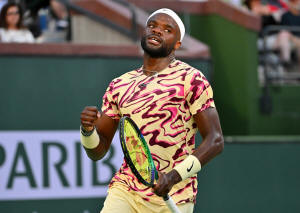|
"I think fans should be able to come and go and
move around and speak during matches," Tiafoe told Forbes.
"Imagine going to a basketball game and not saying anything."
Tiafoe told the magazine that certain events like Wimbledon
should retain some tradition but "outside that, let's start to
change things to bring younger fans to the game."
At last year's U.S. Open, Tiafoe electrified the New York crowd
during his win over Rafa Nadal in the last 16 en route to
reaching his first Grand Slam semi-final.
There he further endeared himself to the fans when he battled
eventual champion Carlos Alcaraz for five sets in front of a
sold-out crowd that included former First Lady Michelle Obama.
It is no surprise then that the 25-year-old from Maryland said
the comparatively rowdy atmosphere at Arthur Ashe Stadium in
Flushing Meadows makes it his favorite court to play on.
"There's nothing like Arthur Ashe at night," said Tiafoe, who
will be in action on Friday in the Miami Open.
"Arthur Ashe period, but Arthur Ashe at night. New York at
night, everyone's drunk and the atmosphere, it's crazy."
Fellow American and world number three Jessica Pegula said she
liked Tiafoe's "positive" ideas but there had to be checks to
ensure players are not disturbed.
"You can't have people shouting in the middle of a point
necessarily, but maybe if the movement was less restrictive, I
don't think it's that big of a deal," Pegula said.
"But then, you open yourself up to things that could happen
where it does maybe cause hindrances throughout the play and it
really affects the players.
"He loves the NBA and goes to games. It's like constant chatter
between the players and the people sitting on the court. There's
a lot of movement, music.
"I think we have to implement some of those things. We have to
fit it to our sport, but the idea is there. Maybe just
fine-tuning it."
(Reporting by Rory Carroll in Los Angeles; Additional reporting
by Shrivathsa Sridhar; Editing by Pritha Sarkar and Stephen
Coates)
[© 2023 Thomson Reuters. All rights
reserved.]
This material may not be published,
broadcast, rewritten or redistributed.
Thompson Reuters is solely responsible for this content. |
|





